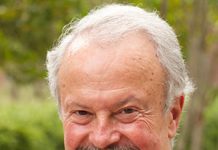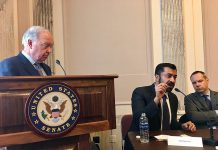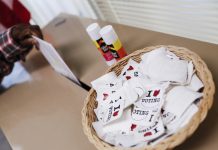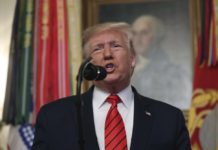DeSantis hopes that a Trump endorsement will get him past Putnam
The Republican primary for governor may come down to an occasional Florida resident who is not even a registered voter in the state.
But President Donald Trump, who owns and frequents the Mar-a-Lago resort in Palm Beach, has had a huge impact in the Aug. 28 GOP primary. And the beneficiary has been U.S. Rep. Ron DeSantis, a three-term Republican congressman from Northeast Florida.
Trump, who is intervening in a number of local and state races across the country, has been talking up DeSantis’ prospects as the next governor since last year. He issued an endorsement tweet on June 22.
“Ron is strong on Borders, tough on Crime & big on Cutting Taxes – Loves our Military & our Vets,” Trump tweeted, while also noting DeSantis’ Ivy League education credentials.
On July 31, Trump made it personal, endorsing DeSantis, who turns 40 next month, at a political rally in Tampa before a raucous crowd of some 10,000 supporters. It provided a bright presidential spotlight for a once-obscure congressman in the state’s largest media market.
“He’s going to be an incredible governor,” Trump said.
DeSantis, a lawyer and U.S. Navy veteran who has carved out a record as one of the most conservative members of Florida’s congressional delegation, has fully embraced Trump’s support. He has melded that with frequent appearances on Fox News, where he has defended the president, as well Trump’s efforts in Congress.
On the morning of his first primary debate with Republican rival Adam Putnam in late June, DeSantis was in Washington, D.C., where as a member of the House Judiciary Committee, he led questioning of Deputy Attorney General Rod Rosenstein about the “anti-Trump bias” in an investigation of the president.
The next day, DeSantis told party activists gathered at a summit in Kissimmee that there are clear differences between himself and Putnam, whom he has labeled as a “career politician.” Putnam is finishing his second term as state agriculture commissioner and previously served in Congress and the Legislature.
“Do you want somebody who has been in politics their whole life and is more of a transactional Republican? Or do you want a conservative, Iraq veteran endorsed by President Donald Trump?” DeSantis told the crowd. “That’s a great contrast. You guys pick.”
Independent polls have shown the strategy has given DeSantis, who flirted with a U.S. Senate bid in 2016, the momentum in the primary, despite the fact that Putnam had raised $37 million for his campaign and political committee through Aug. 3, while DeSantis had raised $16 million.
The trajectory was predicted in an April memo from Brad Herold, DeSantis’ campaign manager, noting that nearly nine of every 10 primary voters approved of Trump and that they were “more likely” to support a candidate that had his endorsement.
“Meaning, as we get closer to the primary election, more of these voters will naturally gravitate to Ron DeSantis as long as we have the resources to inform them of the president’s support,” Herold wrote.
DeSantis’ Washington-centric campaign has drawn harsh criticism from Putnam and his supporters, who charge the congressman has failed to tell voters what he would do as governor.
In their final debate in Jacksonville, Putnam likened DeSantis’ campaign to the television show “Seinfeld,” which was famously a comedy “about nothing.”
“But, unlike Seinfeld, it’s not funny,” Putnam said about DeSantis’ campaign. “Floridians deserve better than to have a candidate that makes it all about themselves and not about the future of Florida.”
DeSantis’ supporters liken Putnam’s campaign to another long-time Florida politician, former Attorney General Bill McCollum, who lost to a political newcomer, Rick Scott, in the 2010 GOP gubernatorial primary. Using his personal wealth, Scott was able to align his successful campaign with the rise of tea party conservatives.
“I think he is this year’s Rick Scott in terms of his ability to articulate an outside message to Republicans who are tired of long-time, career politicians,” former state Senate President Don Gaetz, R-Niceville, said before an Aug. 2 political rally for his son, U.S. Rep. Matt Gaetz that also included DeSantis and Donald Trump Jr.
The elder Gaetz said he would like to see more discussion about critical state issues, but he also said DeSantis was responding to a GOP electorate that is interested in national issues like immigration, the economy and the U.S. military.
“That’s what is on people’s minds,” Gaetz said. “In that sense, DeSantis is made for the moment because he’s a candidate with a national understanding. But he certainly has the capacity and the experience to be the governor of Florida.”
Ronald Dion DeSantis was born Sept. 14, 1978 in Jacksonville. But he grew up in what he described as a blue-collar environment in Dunedin with his parents, Ronald and Karen, and a sister. DeSantis had an early brush with fame when his local baseball team made it to the Little League World Series in 1991.
DeSantis’ performance as a student at Dunedin High School helped him win admission to Yale University, where he earned a bachelor’s degree in history. He was also the captain of the school’s baseball team.
He went on to earn a law degree from Harvard University in 2005 and joined the U.S. Navy’s Judge Advocate General Corps. As a military lawyer, DeSantis was assigned to duties at the Guantanamo Bay detention facility, which houses suspected terrorists.
In 2007, he was assigned to a SEAL team that was deployed to Iraq, and he served as a legal adviser. He returned to the United States in 2008 and left active military service in 2010.
In 2009, he married Casey Black, a Jacksonville television personality. The couple has two young children, with a son born in March and a daughter born in November 2016.
DeSantis reported a net worth of $311,000 in 2017, with his largest asset being a $400,000 home in Ponte Vedra Beach, a seaside community in St. Johns County south of Jacksonville.
DeSantis won election in 2012 to an open congressional seat, which after redistricting now includes Volusia and Flagler counties and portions of St. Johns and Lake counties. He was re-elected in 2014 and 2016.
In Congress, DeSantis was one of the founding members of the Freedom Caucus, a hardline conservative faction that has pushed for reductions in federal spending, advocated for tougher immigration measures and called for the repeal of the Affordable Care Act.
How DeSantis will apply those conservative principles to his role as governor is largely unknown because of the dearth of detailed policy statements from the candidate.
He has repeatedly talked about appointing “conservative constitutionalists” as judges, noting three new state Supreme Court justices will be appointed in January.
DeSantis said he wants to emphasize the teaching of the U.S. Constitution in Florida classrooms in “a big way.”
He has also vowed to confront the issue of toxic algae in waterways in Southeast and Southwest Florida and to back the use of an electronic verification system to determine the immigration status of workers.
But a recurring theme in all of DeSantis’ campaign speeches has been his relationship with Trump. It was exemplified by his concluding remarks to party activists in Kissimmee in June.
“I have compiled a record of conservative leadership that is second to none, and I am endorsed by the president of the United States, Donald J. Trump,” DeSantis said, before reading a portion of a December tweet where the president called him “a brilliant young leader” who would make “a great governor.”
NEWS TALK FLORIDA MUST READS














